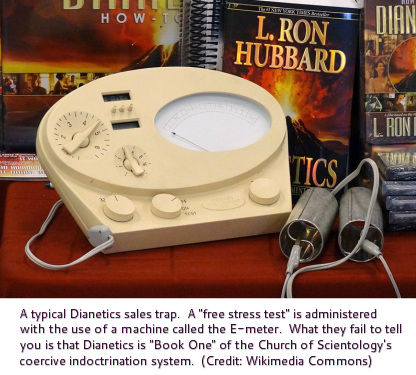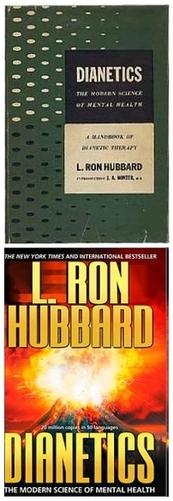
beware of dianetics!
Have you encountered a stress test booth in your community? Or maybe you were approached by someone offering a free personality test. These services might seem harmless if you do not realize the connection between Dianetics, Scientology and L. Ron Hubbard. A book sale may be followed by courses and more counseling services. Before you know it, you are caught in the money-making scheme of a fraudulent organization that ruins lives.
The Dianetics Scam: A gateway into the Church of Scientology

Embossed collector's edition of Dianetics.
(Credit: Church of Scientology Phoenix
2013 Ideal Org Promotion)
(Credit: Church of Scientology Phoenix
2013 Ideal Org Promotion)
Dianetics is a dangerous pseudoscience, not a legitimate mental health therapy. It is designed to find a person's weaknesses and exploit them for the sake of profit. Services on an E-meter may seem harmless at first, but the situation can quickly become financially draining, since Dianetics serves as a gateway into the Church of Scientology psychotherapy cult. This deceptive self-help system was crafted by science fiction writer L. Ron Hubbard, a convicted criminal and con man, for his own personal gain. Hubbard’s legacy continues to this day, with his Dianetics theories serving as the initial indoctrination step into costly Scientology beliefs and practices.
This website attempts to expose the Dianetics pseudoscience scam by revealing its empty promises, lack of scientific evidence and common recruiting methods. Questions were raised about whether Hubbard had been practicing unlicensed medicine, and we will examine how he avoided the issue with his creation of a destructive cult. We will also cover why the Scientology founder was so crazy and learn what the real truth is behind the Church of Scientology's deceptive propaganda.
This website attempts to expose the Dianetics pseudoscience scam by revealing its empty promises, lack of scientific evidence and common recruiting methods. Questions were raised about whether Hubbard had been practicing unlicensed medicine, and we will examine how he avoided the issue with his creation of a destructive cult. We will also cover why the Scientology founder was so crazy and learn what the real truth is behind the Church of Scientology's deceptive propaganda.
What is dianetics?
Dianetics is a set of ideas and practices regarding the metaphysical relationship between the mind and body which was created by L. Ron Hubbard and is practiced by followers of Scientology. Hubbard coined Dianetics from the Greek stems dia, meaning "through", and nous, meaning mind.
Dianetics divides the mind into three parts: the conscious "analytical mind," the subconscious "reactive mind", and the somatic mind. The goal of Dianetics is to remove the "reactive mind", which Scientologists believe prevents people from becoming more ethical, more aware, happier and saner. The Dianetics procedure to achieve this is called "auditing". Auditing is a process whereby a series of questions are asked by the Scientology auditor, in an attempt to rid the auditee of the painful experiences of the past which scientologists believe to be the cause of the "reactive mind." -- Excerpt from Wikipedia: Dianetics as of January, 2013.
Is it really the modern Science of Mental Health?
Another basic assumption [in Dianetics] was that all answers are simple. In order to make the facts agree with that assumption, he then proceeds to simplify and oversimplify until everything is just an "engram". An "engram", from the description, appears to be what psychiatrists years ago called "memory trace".
The technique of using old psychoanalytical concepts under new names is frequently followed, and the idea that it is possible to change something by giving it a new name is clung to throughout [Hubbard's book on Dianetics]. ...
The use of such vague terms and even vaguer concepts abounds in Hubbard's presentation of his theory. They are significant in that they serve to obscure the real fallacies of Dianetics. -- Excerpt from Dianetics: Can it Help You or Harm You? by Oscar Sachs, M.D. as published in Why: the magazine of popular psychology, in 1950.
why is dianetics so dangerous?
From a psychoanalytic point of view, one is willing to overlook the fact that Hubbard presents no conception of human relationships, that he has no psychodynamic point of view. One can also forgive him for encouraging neurotic people to avoid all professional sources of help, and even for deluding people into expecting salvation through guaranteed solutions for their problems. After all, there have been many other "faiths," movements, or special therapies which have failed to fulfill these criteria and have still helped people where the experts have failed.
The real and, to me, inexcusable danger in dianetics lies in its conception of the amoral, detached, 100 per cent efficient mechanical man - superbly free-floating, unemotional, and unrelated to anything. This is the authoritarian dream, a population of zombies, free to be manipulated by the great brains of the founder, the leader of the inner manipulative clique. Fortunately for us this is an unattainable dream, on the rocks of which every great authoritarian leader has sooner or later met his fate. We have learned by this time that a human being cannot exist without effective human relationships, which must fulfill some of his healthy emotional dependencies; and that mechanical, detached self-sufficiency does not exist except in a psychotic state. -- Excerpt from Dianetics: A Cure for All Ills, 1950 book review by Milton R. Sapirstein, M.D. as published in The Nation.
What did Hubbard's medical expert say about dianetics?
By October, 1950, I had come to the conclusion that I could not agree with all the tenets of dianetics as set forth by the Foundation. I could not, as previously mentioned, support Hubbard's claims regarding the state of "clear." I no longer felt, as I once had, that any intelligent person could (and presumably should) practice dianetics. I noted several points on which the actions of the Foundation were at variance with the expressed ideals of dianetics: one of these points was a tendency toward the development of an authoritarian attitude. Moreover, there was a poorly concealed attitude of disparagement of the medical profession and of the efforts of previous workers in the field of mental illness. Finally, the avowed purpose of the Foundation -- the accomplishment of precise scientific research into the functioning of the mind -- was conspicuously absent.
I expressed my opinion on these matters to the Board of Trustees on several occasions, with no discernible effect. Nor was I alone in my disagreement with the Foundation policies; those of us who advocated a more conservative attitude were in the minority, however, and our efforts were unavailing. I therefore, felt it incumbent upon me to submit my resignation. [...]
I feel also that medical practice might be improved by utilization of some of the observations which have been noted in dianetics. However, in order to make any new idea acceptable to the medical profession, it should be presented in a scientific manner. That, I fear, is not going to happen so long as the Foundation pursues its present policies. [...]
Even a wrong answer is closer to the truth than an apathetic "I don't know"; a wrong answer can be proved to be wrong, and the correct answer sought, while unquestioning ignorance or hopelessness leads only to stagnation. -- Excerpt from A Doctor's Report on Dianetics: Theory and Therapy by J. A. Winter, MD first published in 1951.
Understanding dianetics

1950 first edition and 2007
edition book covers. (Credits:
Wikimedia Commons)
edition book covers. (Credits:
Wikimedia Commons)


No comments:
Post a Comment
Note: Only a member of this blog may post a comment.